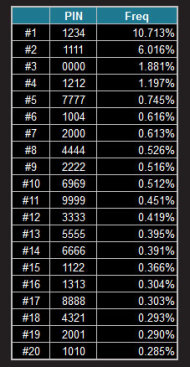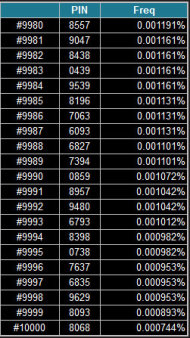Protect Your 4 Digit Pin Number
 The safest 4-digit PIN is '8068' — or at least it was, until researchers at Data Genetics told everyone this week. The researchers there went through a set of 3.4 million four-digit personal identification numbers and found "8068" came up only 25 times.
The safest 4-digit PIN is '8068' — or at least it was, until researchers at Data Genetics told everyone this week. The researchers there went through a set of 3.4 million four-digit personal identification numbers and found "8068" came up only 25 times.
But now that this news is out, that's probably a PIN to stay away from. As Softpedia pointed out, would-be thieves may start trying that combination right after they hit "1234" ― the most common PIN, with nearly 11 percent frequency.
While not as common as 1234, there are several numbers that people seem drawn toward. For instance, PINs starting in "19" are common because people like to link their identification numbers with a significant year. In fact, all PINs that start in 19 fall into the top fifth of the dataset.
The top 20 includes all the series in which the first number is repeated throughout (such as 3333) plus 4321, 1212 and 2001. The study also found that many PINs are based on visual clues. Coming in at No. 22 is 2580 ― the numbers that run down the middle of a phone or ATM keypad.
Based on this report, more than10 percent of all bank accounts can be hacked with one guess. Beyond that, one-third of all PINs are made up of just 61 variations.
Even when PINs get longer, security doesn't seem to improve. Regardless of length, the most popular personal identification numbers appear in sequential order. As for the second-most common combinations, among seven-digit PINs it's 7777777. Six digits? 123123. What about nine? 987654321.
It's also important to note that PIN users are fans of 1980s band Tommy Tutone. "Jenny's" number, 8675309, is the fourth most-popular seven-digit PIN.
So what is the most secure PIN now that 8068 has been outed as the least popular? It's the one you make up, don't write down and don't share with anyone. As long as you don't use your birthday (or your spouse's or child's), or 1234, your PIN should be just as secure as the gentleman's at the ATM in front of you.
Copyright 2012 SecurityNewsDaily, a TechMediaNetwork company. All rights reserved. This material may not be published, broadcast, rewritten or redistributed
Cracking Your PIN Code: Easy as 1-2-3-4
If you lost your ATM card on the street, how easy would it be for someone to correctly guess your PIN and proceed to clean out your savings account? Not long, according to data scientist, Nick Berry, founder of Data Genetics, a Seattle technology consultancy.
Berry analyzed passwords previously from released and exposed password tables and security breaches and filtered the results to just those that were exactly four digits long [0-9]. There are 10,000 possible combinations that the digits 0-9 can be arranged to form a four-digit code. Berry analyzed those to find which are the least and most predictable. He speculates that if users select a four-digit password for an online account or other web site, it's not a stretch to use the same number for their four-digit bank PIN codes.
What he found, he says, was a "staggering lack of imagination" when it comes to selecting passwords. Nearly 11% of the 3.4 million four-digit passwords he analyzed are 1234. The second most popular PIN in is 1111 (6% of passwords), followed by 0000 (2%). (Last year SplashData compiled a list of the most common numerical and word-based passwords and found that the "password" and "123456" topped the list.)

Berry says that a whopping 26.83% of all passwords could be guessed by attempting just 20 combinations of four-digit numbers (see first table). "It's amazing how predictable people are," he says.
We don't like hard-to-remember numbers and "no one thinks their wallet will get stolen," Berry says.
Days, months, years
Many of the commonly used passwords are, of course, dates: birthdays, anniversaries, the year you were born, etc. Indeed, using a year, starting with 19__ helps people remember their code, but it also increases its predictability, Berry says. His analysis shows that every single 19__ combination be found in the top 20% of the dataset.
"People use years, date of birth — it's a monumentally stupid thing to do because if you lose your wallet, your driver's license is in there. If someone finds it, they've got the date of birth on there. At least use a parent's date of birth [as a password]," says Berry.
Keyboard patterns

Somewhat intriguing was #22 on the most common password list: 2580. It seems random, but if you look at a telephone keypad (or ATM keypad) you'll see those numbers are straight down the middle — yet another sign we're uncreative and lazy password makers.
The least predictable password
The least-used PIN is 8068, Berry found, with just 25 occurrences in the 3.4 million set, which equates to 0.000744%. (See the second table for the least popular passwords.) Why this set of numbers? Berry guesses, "It's not repeating pattern, it's not a birthday, it's not the year Columbus discovered America, it's not 1776." At a certain point, these numbers at the bottom of the list are all kind of "the lowest of the low, they're all noise," he says.
A few other interesting tidbits from Berry:
-The most popular PIN code (1234) is more popular than the lowest 4,200 codes combined.
- People have even less imagination in choosing five-digit passwords — 28% use 12345.
- The fourth most popular seven-digit password is 8675309, the Tommy Tutone song.
-People love using couplets for their PINs: 4545, 1313, etc. And for some reason, they don't like using pairs of numbers that have larger numerical gaps between them. Combinations like 45 and 67 occur much more frequently than 29 and 37.
- The 17th-most common 10-digit password is 3141592654 (for you non-math nerds, those are the first digits of Pi).
- Printer-friendly version
- Log in to post comments
- 4267 reads

